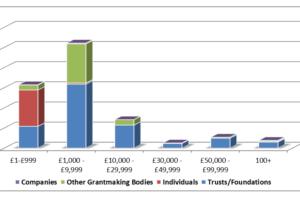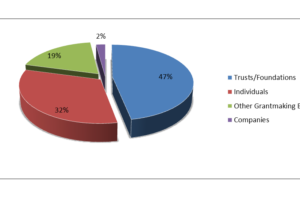Welcome to the July 2016 issue of the Factary Phi Newsletter.
Major Giving News
London Business School to receive £10m
South African businessman Nathan Kirsch has received the distinction of becoming the largest single donor to London Business School.
The philanthropist, who made his name as a property developer, has two grandchildren who have been associated with the institution. Speaking on his donation, he also added that he was surprised to discover that LSB had such a low endowment:
‘The Americans have a much more active alumni stream in money-raising and promoting the university’. He said that he hoped his donation would ‘create a benchmark for other people to match. It’s not over the top but it’s meaningful’
Slimming World campaign raises £2.1m
Weight-loss organisation Slimming World has raised an estimated £2.1m for Cancer Research UK in only two weeks.
Johanna Mather, who is marketing coordinator at Slimming World said that the organisation was delighted to have broken the £2m barrier in such a short period.
‘Not only is the clothes throw a perfect opportunity for Slimming World members to celebrate their slimming success and the fact they’ll never need their ‘before’ clothes again, it is also vital to spread the message that keeping a healthy weight could reduce the risk of developing 10 different types of cancer’.
Report: Collaboration
This month we have included our summary of CAF’s recent report on the value of charity to British households. It is entitled ‘Charity Street II’, the paper was produced by the Foundation for Social Improvement (FSI) as a part of Small Charity Week.
Introduction
Following on from the first edition of this report completed in 2014, CAF have decided to revisit and enhance the quantitative survey that was used as part of the research. This has been done in the hope that this topic can be understand in more detail and to see what, if anything, has changed in since the original report was published.
Much like the previous edition, the aim of the report is to gain a deeper understanding of how households and individuals use charitable services, and also to try and understand how aware they are of other charitable services which they may not necessarily use.
Key Findings
- The use of charity services is widespread – the report found that nearly every household in the UK (98%) had made use of a charity at some point, with four out of five (83%) stating that they had used a charity service in the last 12 months.
- Use of charities is on the rise – Since 2014, there has been a notable increase in the household use of charity services.
- Those in the least deprived areas of the UK access a larger of charitable services – People living in the least deprived areas in the UK have accessed on average 6.24 services com-pared with 5.60 services for those in the most deprived areas. The least deprived were associated with services provided for entertainment or education (museums and universities etc), while those in the most deprived areas were found to be more likely to access services associated with support, advice, care or housing.
- Young people and women are more likely to personally make use of such services – 18-24 year olds were found to be more likely to have personally used a charity service in the last month (60% vs 50% overall) and women are more likely to have used a service in the last month compared to men (54% vs 44%)
- Charities are seen to provide a wide range of benefits to people – the most common benefit reported from the use of these services was providing an enjoyable/fun experience (22%, up from 13% in 2014). The second biggest benefit was receiving emotional support or counselling from a charity service (20%, up from 14% in 2014).
- Charity or not a charity? – almost a quarter (23%) were unaware that the services that they, or someone in their household had used were run by charities
- There is a lack of charitable awareness – just 8% of these interviewed were aware that all of the services that were included in the research were run by charities.
- Charities underpin society – people believe that charities play an essential/very important role in society in general (92%), as well as in the area in which they live (80%). More than 2 in 5 (43%) felt that charities play an essential role in their lives and those of their household
- Charities are best placed and most trusted to speak for the disadvantaged -84% felt that charities were best placed to speak on behalf of disadvantaged people and 76% said they most trusted charities to do this. This is, the report notes, significantly higher than for politicians where 27% felt MP’s were best placed and just (3%) said they would trust them most to speak on behalf of disadvantaged people.
Recommendations
Based on the findings of the report, researchers recommended that:
- As those from the most deprived backgrounds are far more likely to turn to charities that will provide support and advice, government and funders should try to examine the links between charitable provision and deprivation, as means of ensuring that charity support is accessible to those who need it most.
- Charities are the best placed to speak up for the disadvantaged, often because they so frequently interact with them on a daily basis and therefore will have an understanding of their issues. Because of this, Government should work collaboratively with charities and make use of this expertise when developing public policy.
- Awareness of the services that charities provide remains relatively low. As such, charities offering their services to people should seek to promote and raise awareness of their status, particularly in order to make use of the affinity that people feel towards charities in order to promote public trust and confidence in them.
- People are more positive about the importance of charities across society generally, than in their own local area. As the Government pushes forward plans for greater devolution and localism, it is important that charities are provided with opportunities to get involved with the provision of local services to use their own expertise and experience to help local people.
Clickhere for a full version of the report.
Phi in Numbers: July 2016
For this month’s database update, we have decided to include an overview of the Armed Forces activity type as it appears throughout the database. Phi currently holds 1,419 records of donations to armed forces charities worth a minimum of £21,956,201.
Above we have included a bar chart showing the number of donations in this activity type split according to banding and donor type, and as is evidenced by the graph, the largest proportion of these donations have been in the £1,000-£9,999 banding, with 522 records overall.
Below, we have also included a separate chart showing the makeup of this activity type according to donor.
As the chart above shows, almost 50% of all donations in this area have come from the Trusts & Foundations donations donor type.
Profile: The Beatrice Laing Trust
The trust was established in 1952 by Sir John Laing, an entrepreneur and businessman in the construction industry.
Born in 1879, he inherited his father John’s building business, now known as John Laing plc – in the early 1900s. As its head, he was credited for its expansion from a local building company into a national firm, culminated in the rebuilding of Coventry Cathedral in the year 1962. He married Beatrice Harland in September 1910, after whom this trust is named.
In terms of its remit the trust is focused on the advancement of the evangelical Christian faith, and organisations which provide support for most vulnerable and disadvantaged in society, including the homeless, the elderly, former armed forces members and ex-offenders.
For the financial year ending the 05th April 2015 the foundation reported an income of £2,443,637 and an expenditure of £2,253,999. Factary Phi holds 363 records of donations made since 2005 worth a minimum of £1.7m.
The highest proportion of these have been made to causes associated with Religious Activities (91), followed by Disability (56), Children/Youth (40), Health (38), Development/Housing/Employment (35), Education/Training (25), Welfare (23), International Development (18), Elderly (8), General Charitable Purposes (7), Heritage and Mental Health (6), Rights/Law/Conflict and Sport/Recreation (4).
The Trustees
Christopher Laing
Christopher Laing OBE has held a number of positions with John Laing plc including as the company’s Director of Environmental Affairs. He retired from this position with the company in 2002 to take up a career in the voluntary sector, during which time he served as a Chairman of the National Playing Fields Association and as a Trustee of Global Action Plan and the Hertfordshire Community Foundation. He is currently Trustee of both the John Laing Charitable Trust and his own Christopher Laing Foundation.
Sir Martin Laing
Sir Martin Laing is a grandson of Sir John Laing and the son of Sir Kirby Laing. He is a former Chairman of John Laing plc and he is featured on the Sunday Times Rich List 2016 with an estimated wealth of £160m based on his position and career with the company y. He is a Trustee of the John Laing Charitable Trust and the Martin Laing Foundation.
Mr David Laing
Mr David Laing is Chairman of the Kirby Laing Foundation and he is also a Trustee of the David Laing Foundation, Northamptonshire Association of Youth Clubs, The National Hockey Foundation and the Swifts Sports Trust.
Mr Charles Laing
Mr Charles Laing is the Operations Director of construction consultancy CLPM Ltd. Before this he has held a variety of positions with John Laing plc including as project director, coordinator and manager. He is a Trustee of The Early Opera Company Ltd and the Maurice and Hilda Laing Charitable Trust.


